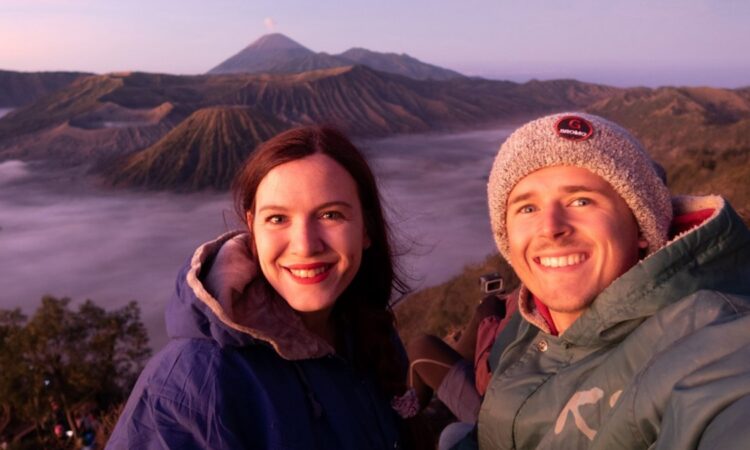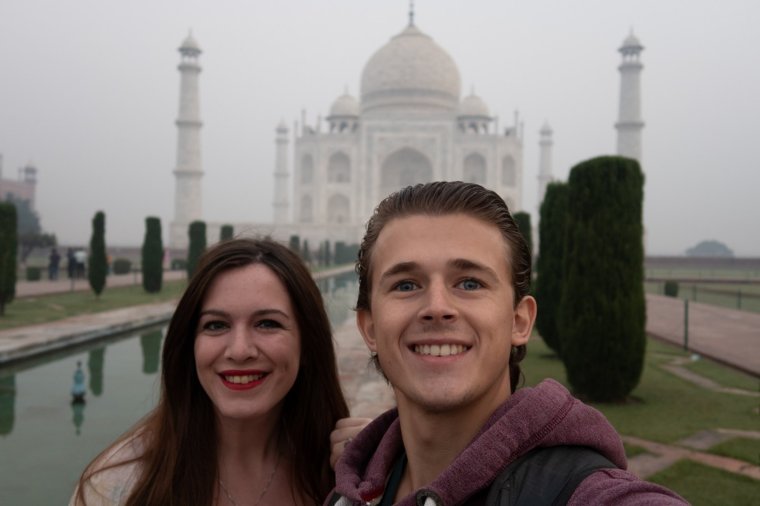
In our How I Manage My Money series we aim to find out how people in the UK are spending, saving and investing money to meet their costs and achieve their goals.
This week we speak to Cazzy Magennis, 29, from Belfast, and Bradley Williams, 29, from Kent, a couple living in a campervan while travelling around the world. Cazzy and Bradley run a travel website called Dream Big, Travel Far and enjoy a combined monthly salary of £10,000. The couple plan to buy a houseboat in the UK later this year and, at some point, would love to buy some land and build a house. When it comes to investments they reckon property trumps pensions in the long run.
Monthly budget
Income: Our travel website, Dream Big, Travel Far, brings in between £20,000 to £25,000 a month. We each take out about £5,000 a month each from the business, so our combined monthly income is £10,000.
Outgoings: Our monthly outgoings vary month to month depending on which country we are in. Most of our outgoings come out of a Monzo account.
Groceries and sundry items, around £620 a month; fuel for campervan, this varies hugely but can be as much as £1,600 to £1,800 a month in areas like North America; mobile phone bills for the two of us, £21; eating out, £500; gas, £7.50 to £15 a month; campsites, £20 to £40; tourist attractions, between £50 and £150; water is free, we’ve never paid for it; Netflix, £15.99; Audible, £6.99; using launderettes, £25.
We pay travel insurance in a lump sum and a six-month trip costs the two of us anything from £200 to £400 in total. Country access requirements and fees can also vary and cost about £10 to £40 a time. The cost of insurance for the campervan varies significantly depending on where we are. In Colombia insurance for the campervan was £60 for three months, while in Canada and the USA it was about £800 for six months.
If we are shipping the campervan and our belongings long distances, the cost is generally around £3,000 to £4,000 a time.
We met and got together while studying at the University of Exeter. After finishing our studies we both did some copywriting work for a year or so while building up our business on the side. We’d each make about £1,000 a month doing this. We’ve also done other various jobs like working at Boots and waitering.
We didn’t want to go straight into full-time jobs after university and travelling felt like the right thing to do so we headed off for our first big four-month trip to South America in 2016 and funded it with savings which soon ran out, so we returned home. However, the travel bug didn’t go away.
We launched our travel website, Dream Big, Travel Far in 2016. In the first few years of launching, it made us about £200 to £300 a year, but in 2018 we decided to commit ourselves full-time to the website and this has changed our lives. By 2018 the site made around £4,500 in a year and by 2019 it was making between £3,000 to £4,000 a month. When Covid-19 hit this went down to about £200 a month. Now the website brings in about £20,000 to £25,000 a month, and we each take a salary of £5,000 a month from the business.
We make money via adverts on the website and earn a commission if someone books a hotel or tour on it. We get about 500,000 monthly page views. It’s a numbers game – the more people on your website, the more money you will make.
Just before the pandemic struck, we’d been travelling and living in Malta. When Covid-19 hit, we moved back to Belfast. In the summer of 2020, we decided to buy a van and convert it into a campervan, with the aim of travelling around the world in it once global pandemic restrictions eased.

We purchased a Peugeot Boxer van for £6,500 and called her Helen. It took us three months to convert the van into a liveable campervan and we did most of the work ourselves, with the help of YouTube videos and a few knowledgeable people. In total we spent about £12,000 converting the van. Since setting off in the campervan in March 2021 we’ve been to more than 30 countries. While overseas, we use Monzo and Revoult accounts and cards while travelling and rarely use cash.
Money brings us freedom and flexibility and it would be difficult to do what we do without it. In future, we’d both love to each have an annual salary of about £100,000 a year, giving us a combined yearly income of £200,000. It’s a working goal for us and we hope it’ll be a reality by 2024.
Later this year we plan to buy a houseboat in the UK for around £40,000 to £60,000. Ultimately, we’d like to buy land and build our own home in Kent. But, with the cost of land in Kent being so expensive, we probably need a budget of between £700,000 to £1m to make our dream a reality. So, we would need to be able to put down about £300,000 to £400,000 and get the rest via a mortgage. We are also interested in purchasing a few buy-to-let properties in future, and view them as long-term investments.
We’re aiming to build up a number of investments in time, including pensions. Neither of us have started putting money into a pension yet but we plan to start doing this within the next few months. We’d like to put £300 to £500 each per month into a pension pot for the next 30 years, which could leave us with a total of around £1m by the time we are 65. But for us, a pension would constitute a worst-case solution to fall back on. They can be volatile and actual yearly returns are not guaranteed.
We would like to think that with good financial planning, we will have a whole host of other passive income sources and investments in place at the time of reaching whatever the retirement age may be at that time. Having a healthy pension in place would be nice to have, but in terms of planning for expenses at that stage of our lives, we wouldn’t like to be reliant on it. Both of us also plan to start saving money into Isas over the coming months and use up the annual tax-free allowance whenever we can.
The industry we’re working in can be unpredictable so it’s not always easy to plan far ahead with financial goals. We take each day as it comes and appreciate what we are doing.






